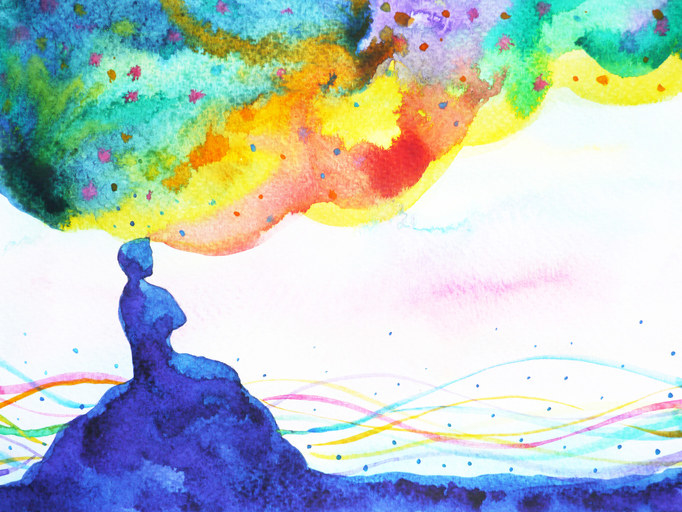We sat down with Dr. Robin Henderson to discuss mental health, therapy, and how to best take care of our holistic selves.
Dr. Robin Henderson is a psychologist and is a Chief Executive of Behavioral Health for Providence St. Joseph Health. Henderson also serves as the Clinical Liaison for Well Being Trust (WBT), whose mission is to improve the mental, social, and spiritual health of the nation.
Here's what she had to say.

First off, how might we prioritize self-care on a daily basis?
Dr. Henderson: We don't do a good job of taking care of ourselves. It's really a matter of trying to figure out how to best take care of "me." Even if it's just as simple as taking a 10-minute walk to clear your head, or a drive before work with your phone off — whatever it is that you do that fills your cup. If we look at our own care as being a limited resource, it's really hard for us to give away what we don't have.

How might people living with anxiety attempt to calm themselves in a moment of acute stress or pressure?
Dr. Henderson: People living with anxiety have some real challenges and barriers. One of the tools I recommend to help combat these feelings is called "four square breathing." It's a really simple technique where you take a deep breath in and count to four, and when you get to four, you hold it for four seconds, and then you exhale for four. And you do that at least two times with your feet on the floor and your shoulders back and your eyes closed. And that's a simple way to ground yourself. I also do a guided meditation myself, imagining I am at the beach with things that bring me peace. Build a mind palace and figure out how to get yourself there. Take in all of the goodness and push out all of the darkness.
How might you suggest broaching your own personal mental health matters with friends and/or peers?
Dr. Henderson: It's a really hard thing to talk about yourself. I've actually found that teenagers seem to be a lot more comfortable about it than we as adults are. I've heard them talk about their own mental health conditions the way they might talk about an injured knee. And it's instructive. We need to de-stigmatize mental illness by owning it. Everybody has something, right? The more we talk about it, the more we normalize it. And we learn things from other people when we talk about it.

How would you suggest speaking to family members who might benefit from therapy? What would be the best way to broach that subject with them without sounding "judgy"?
Dr. Henderson: The more that you can personalize it and really make it something that's coming from you, the better. Sharing your own personal experience is the easiest way to get into that. Also, encouraging people to speak with their family doctor can be one way in. That may be easier than going out into the world and finding a therapist. Finding a therapist is hard. A lot of people might say: "Oh, I tried therapy; it didn't work for me." But you know what? If you tried therapy and it didn't work for you, try another therapist. There are a lot of them out there.
Going off that, how do you know when it might be time to break things off with a therapist you're not totally clicking with?
Dr. Henderson: There are two kinds of uncomfortable in therapy. The first is: "I'm uncomfortable because we're uncovering things that I don't really want to talk about." That's a therapist you should stay with. The second is: "I feel like I'm coming here and I'm really not getting anything from this." That's when you might want to start a conversation with your therapist in which you let them know it really isn't working for you.
Perhaps you can ask to try something different, and some therapists are open to that. Others might get defensive. The minute your therapist gets defensive about that, it's time for a new therapist. Invariably I find that if someone isn't feeling good about therapy or isn't making progress, their therapist also isn't feeling good about it.

What might be the best way to prep for a therapy session?
Dr. Henderson: Put yourself in a space where you're going to be honest and open. Share your truth. Your therapist isn't there to judge you. Being open to sharing your truth and listening and hearing what your therapist has to say, even if it's hard to hear, that's the best way to prepare.
Also, don't place therapy in the middle of a packed day. If you have therapy, make time for yourself afterwards. Your brain needs some time to process. Therapy is like PT for the mind, right? You don't go and work out after you have a physical therapy session.
How can we be more mindful and avoid triggering other people living with mental illness? How can we be more mindful of those around us living with mental illness?
Dr. Henderson: If you have a physical health issue, people can see it. If you break your leg, people can see it and they respond accordingly. But if you break your heart, that's harder to see. Being aware that all of us have the potential, if not the actual experience of struggling with something — it comes down to common courtesy. When you ask someone how they are doing, really listen to them. When someone asks you how you are, instead of just saying "I'm fine!" tell them how you're really feeling.
Mental health conditions are just as prevalent as physical ones. When people have a major physical illness, or they're getting ready to have a baby, we send food and flowers and everything that comes along with it. But for people struggling with mental illness, we don't act similarly. You know, if someone is in the middle of a depressive episode, the last thing they want to do is cook. If someone comes by with a meal, for example, that could be a really big turning point.

Are there any mental health benefits to social media, or is it all detrimental?
Dr. Henderson: Actually, there are a lot of mental health benefits to social media. It can be a very supportive environment for people struggling with mental health conditions. It just depends on how you use it and when you use it and what you do with it. For example, some use social media for positive ways to connect with friends when they're struggling with depressive ideations. When you find yourself comparing your life to others in a negative way, that's when you should close your computer or put down your phone and go take a walk. This is the same for having a conversation with a friend in real life, too. Social media is so concentrated, but these experiences happen on and off the internet. The reality is, we had these problems before social media. We have to figure out: How do we detach from toxic situations? That's really what it's about.
What might you say to someone who is on the fence about receiving therapy?
Dr. Henderson: Get off the fence. Meaning: It's 2019, this is a world in which we know that our minds and bodies are connected. We know that what happens to our bodies affects our minds, and what happens to our minds affects our bodies. Being afraid to go to therapy is a perfectly normal thing. Actually, it's kind of like being afraid of going to the dentist. Few people wake up in the morning saying, "I'm so excited to go to the dentist today!" And why are we afraid of the dentist? Because of the physical pain. That's the same thing with therapy: We're afraid we're going to have to face the pain. We know we need to get our teeth cleaned in order to have a healthy mouth. For a healthy mindset, you've got to get your emotions taken care of so that you can go out there and live your life and take care of the people you love. But that starts with taking care of you.
All images from Getty/iStock
